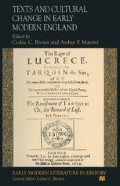Abstract
When the anonymous Catholic political libel against the Earl of Leicester which first circulated in manuscript in the late 1580s came into print in 1641 as Leicester’s Commonwealth at the time of the Irish Rebellion and on the eve of the English Civil Wars, that old text clearly meant something very different in its new historical circumstances from the context of Elizabethan Protestant—Catholic propaganda wars and factional struggles at the Elizabethan Court. Similarly, when in 1638 the royalist publisher Humphrey Moseley published the Latin epigrams of Sir Thomas More over a hundred years after their composition, or produced a magnificent folio edition in 1647 of the collection of dramas associated with Francis Beaumont and John Fletcher, old texts were given new life and new meaning in new circumstances. Even works that were much reprinted, like Sidney’s Arcadia, whether or not their texts were altered, corrupted or accompanied by different paratextual1 material, inevitably changed because the conditions in which they were reproduced and were received had changed, making them new or different works.
Access this chapter
Tax calculation will be finalised at checkout
Purchases are for personal use only
Preview
Unable to display preview. Download preview PDF.
Notes
The term is coined by Gerard Genette: see, for example, his ‘Introduction to the Paratext’, trans. Marie MacLean, NLH 22 (Spring 1991): 261–72. Peter Lindenbaum’s essay discusses paratextual issues related to the printing of Sidney’s Arcadia.
See Michael Dobson, The Making of the National Poet: Shakespeare, Adaptation, and Authorship, 1660–1769 (Oxford, 1992),
Gary Taylor, Reinventing Shakespeare: A Cultural History from the Restoration to the Present (New York, 1989) and
Hugh Grady, The Modernist Shakespeare (Oxford, 1991).
Maria Corti, An Introduction to Literary Semiotics, trans. Margherita Bogat and Allen Mandelbaum (Bloomington, IN, 1978), p. 19.
Selected papers from the first (1989) conference, ‘Politics, Patronage and Literature in England, 1558–1658’, edited by Cedric C. Brown, were published in The Yearbook of English Studies 21 (1991) and republished selectively in Patronage, Politics and Literary Traditions in England, 1558–1658 (Detroit, 1991). Some papers from the second (1992) conference, ‘Politics in English Culture, 1520–1660’, were edited by Cedric C. Brown and published as a special issue of Criticism 35 (Summer 1993).
D. F. McKenzie, Bibliography and the Sociology of Texts (London, 1986).
Leah S. Marcus, Puzzling Shakespeare: Local Reading and its Discontents (Berkeley, Los Angeles and London, 1988) and Unediting the Renaissance (New York and London, 1996).
See Elizabeth Eisenstein, The Printing Press as an Agent of Change … 2 vols (Cambridge, 1979);
Lucien Febvre and Henri-Jean Martin, The Coming of the Book: The Impact of Printing 1450–1800, trans. David Gerard, ed. Geoffrey Nowell-Smith and David Wooton (London and Atlantic Highlands, NJ, 1976);
Roger Chartier, The Cultural Uses of Print in Early Modern France, trans. Lydia Cochrane (Princeton, NJ, 1987) and ‘Texts, Printing, Reading’, in The New Cultural History, ed. Lynn Hunt (Berkeley and Los Angeles, 1989), pp. 154–75; Mary Hobbs, Early Seventeenth-Century Verse Miscellany Manuscripts (Aldershot, 1992); Harold Love, Scribal Publication in Seventeenth-Century England (Oxford, 1993); Arthur F. Marotti, Manuscript, Print and the English Renaissance Lyric (Ithaca, NY and London, 1995); and H. R. Woudhuysen, Sir Philip Sidney and the Circulation of Manuscripts, 1558–1640 (Oxford, 1996).
See Jerome McGann, A Critique of Modern Textual Criticism (Chicago, 1983);
Steven Urkowitz, Shakespeare’s Revision of ‘King Lear’ (Princeton, NJ, 1980); The Division of the Kingdoms: Shakespeare’s Two Versions of King Lear, ed. Gary Taylor and Michael Warren (Oxford, 1983); and New Ways of Looking at Old Texts: Papers of the Renaissance English Text Society, 1985–1991, ed. W. Speed Hill (Binghamton, NY, 1993).
Arguments between New Historicist and cultural materialist critics have led to some political posturing but not much affected critical practice. A useful political critique of new historicism is provided in the anti-regiocentric and historically particular method advocated by James Holston in ‘Ranting at the New Historicism’, ELH 19 (1989): 189–225.
Pierre Bourdieu, Distinction: A Social Critique of the Judgement of Taste (London, 1984).
Author information
Authors and Affiliations
Editor information
Editors and Affiliations
Copyright information
© 1997 Palgrave Macmillan, a division of Macmillan Publishers Limited
About this chapter
Cite this chapter
Brown, C.C., Marotti, A.F. (1997). Introduction. In: Brown, C.C., Marotti, A.F. (eds) Texts and Cultural Change in Early Modern England. Early Modern Literature in History. Palgrave Macmillan, London. https://doi.org/10.1007/978-1-349-25994-6_1
Download citation
DOI: https://doi.org/10.1007/978-1-349-25994-6_1
Publisher Name: Palgrave Macmillan, London
Print ISBN: 978-1-349-25996-0
Online ISBN: 978-1-349-25994-6
eBook Packages: Palgrave Literature & Performing Arts CollectionLiterature, Cultural and Media Studies (R0)

